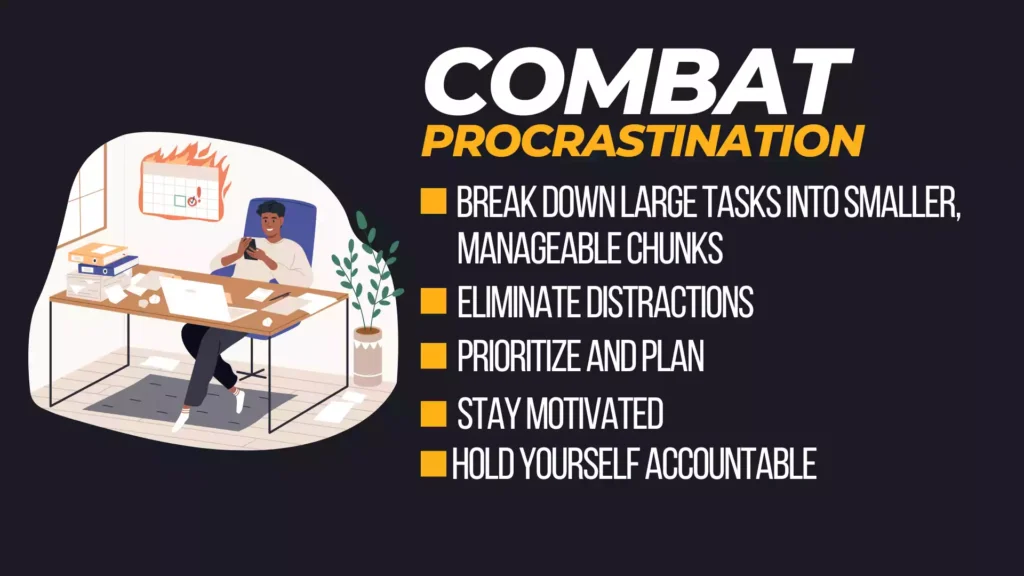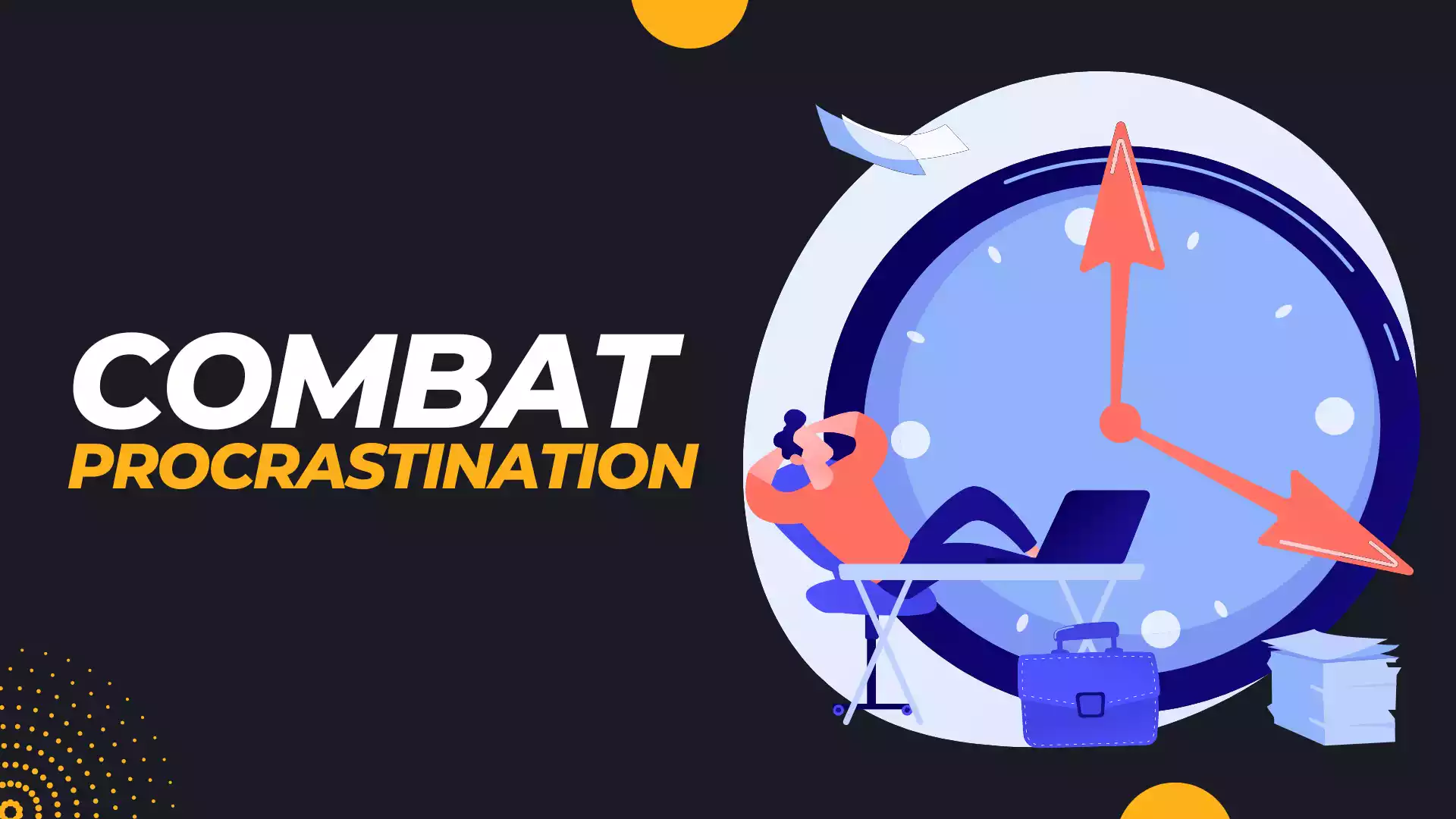Are you constantly putting off tasks until the last minute? Do you find yourself getting easily distracted, and struggling to stay focused?
Procrastination can be a real productivity killer, but the good news is that it is a habit that can be broken. In this article, we will discuss Five effective ways to combat procrastination and increase productivity, so you can get more done in less time and achieve your goals.
From breaking down large tasks to eliminating distractions, we will give you the tools you need to take control of your time and get things done. So, let’s get started on your journey to becoming a productivity pro!
Break down large tasks into smaller, manageable chunks
One of the biggest causes of procrastination is feeling overwhelmed by the size and complexity of a task. When a task seems too big and daunting, it’s easy to put it off and avoid it altogether.
The solution to this problem is to break down large tasks into smaller, manageable chunks. By doing this, you can make a big task feel less intimidating and more manageable, which will make it easier to start working on it and stay motivated.
Here are some tips for effectively breaking down tasks:
By breaking down large tasks into smaller, manageable chunks, you’ll find that it’s much easier to start working on them and to stay motivated. You’ll also be able to track your progress more effectively, which will give you a sense of accomplishment and keep you motivated to complete the task.
Additionally, breaking down large tasks into smaller chunks allows you to tackle them one at a time, which makes it easier to focus on one task at a time and avoid multitasking. Multitasking is often counterproductive as it reduces your focus and productivity. By breaking down tasks into manageable chunks, you can give each task the attention it needs and complete it more efficiently.
Another benefit of breaking down tasks is that it allows you to prioritize and plan more effectively. When you have a clear understanding of the steps required to complete a task, it’s easier to identify which tasks are most important and which can be deferred or delegated. This will help you to focus on what’s truly important and avoid wasting time on less important tasks.
In summary, breaking down large tasks into smaller, manageable chunks is a key strategy for combating procrastination and increasing productivity. By breaking down tasks into smaller goals and creating a schedule or to-do list, you can make big tasks feel more manageable and easier to start working on. Additionally, breaking down tasks allows you to tackle them one at a time, prioritize and plan more effectively, and avoid multitasking.
Eliminate distractions
Distractions are a major cause of procrastination and can greatly impact productivity. Common sources of distractions include social media, email, notifications, and even co-workers. To combat distractions and increase productivity, it’s important to eliminate them as much as possible.
Here are some techniques for eliminating distractions:
- Set designated times for checking email and social media: Instead of checking email and social media throughout the day, set designated times to check them. For example, you could check your email first thing in the morning and last thing at night, and limit your social media time to a specific time slot during the day.
- Use apps or tools to block or limit access to distracting websites: There are many apps and tools available that can help you limit access to distracting websites. For example, you can use apps like Cold Turkey, StayFocusd, or Freedom to block specific websites or apps during certain times of the day.
- Remove notifications: Remove notifications from your mobile and computer that are not essential for your work. Notifications can be a major distraction and can pull you away from what you are doing.
- Create a distraction-free environment: Try to create a work environment that is free from distractions. For example, close your office door, use noise-canceling headphones, or work in a quiet area of your home.
By eliminating distractions, you’ll be able to focus on the task at hand and complete it more efficiently.
Prioritize and plan
Procrastination can often occur when we don’t have a clear plan or when we don’t know what our priorities are. To combat procrastination and increase productivity, it’s important to prioritize and plan your tasks.
Here are some techniques for prioritizing and planning:
- Use the Eisenhower matrix: The Eisenhower matrix is a tool that can help you prioritize tasks by categorizing them as urgent and important, important but not urgent, urgent but not important, or not urgent and not important. This will help you focus on the most important tasks first and avoid wasting time on less important tasks.
- Use the Pomodoro technique: The Pomodoro technique is a time management method that can help you stay focused and motivated. It involves breaking your work into 25-minute intervals (called “Pomodoros”) with short breaks in between. This can help you avoid procrastination by keeping you focused on the task at hand and allowing you to take regular breaks to recharge.
- Create a to-do list: A to-do list can be a great tool for keeping track of your tasks and prioritizing them. It allows you to organize your tasks and schedule your time more effectively.
By prioritizing and planning your tasks, you’ll be able to focus on what’s truly important and avoid wasting time on less important tasks. This will help you to be more productive and achieve your goals.
Stay motivated and hold yourself accountable
Procrastination can often be caused by a lack of motivation. To combat procrastination and increase productivity, it’s important to stay motivated and hold yourself accountable.
Here are some tips for staying motivated and holding yourself accountable:
- Set specific deadlines: When you have a specific deadline, it’s easier to stay motivated and focused on the task at hand. When you set specific deadlines, make sure they are realistic and achievable.
- Track your progress: Keeping track of your progress can help you stay motivated and give you a sense of accomplishment. You can use tools like a to-do list, a calendar, or a productivity app to track your progress.
- Reward yourself: When you complete a task, reward yourself. This could be something small like taking a short break, or something bigger like treating yourself to a nice meal or a fun activity. It can also be a good idea to set up a reward system for yourself, for example for every three task completed, you take a 30-minute break, or for every week without procrastination, you treat yourself to something you like.
- Hold yourself accountable to someone else: Sometimes it can be helpful to have someone else hold you accountable for your tasks. This could be a friend, a colleague, or a mentor. When you know someone else is counting on you, it can be easier to stay motivated and on track.
By staying motivated and holding yourself accountable, you’ll be more likely to complete your tasks and achieve your goals. Additionally, by having someone else hold you accountable, you’ll be less likely to make excuses and more likely to take action.

Conclusion
In conclusion, procrastination can be a major obstacle to productivity, but by using these Five strategies, you can combat procrastination and increase productivity. By breaking down large tasks into smaller, manageable chunks, eliminating distractions, prioritizing and planning, staying motivated, and holding yourself accountable, you will be able to get more done in less time and achieve your goals.
